|
|
|
Sort Order |
|
|
|
Items / Page
|
|
|
|
|
|
|
| Srl | Item |
| 1 |
ID:
156478
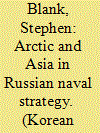

|
|
|
|
|
| Summary/Abstract |
Russian policy in Asia and in the Arctic share significantly overlapping elements.
One such element is the precedent set when the UN awarded the Sea of Okhotsk
to Moscow in 2013. Moscow’s subsequent conduct in closing that sea to foreign
shipping and creating a naval bastion there suggest that it may well do the same
should part or all of its very expansive claim to the Arctic zone off its territory
be recognized by the UN. Inasmuch as Russia has now militarized the Sea of
Okhotsk on the heels of the UN award and added thereby innumerable obstacles
to rapprochement with Japan while also militarizing the area still further, the
likelihood of an Arctic bastion, closed zone, and subsequent militarization cannot
be excluded. Meanwhile, in Asia, Russia will continue to remain at odds with Japan
and see much of Asia as composed of hostile and threatening powers that can only
be dealt with in a context of militarization.
|
|
|
|
|
|
|
|
|
|
|
|
|
|
|
|
| 2 |
ID:
156479
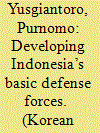

|
|
|
|
|
| Summary/Abstract |
The national resources of Indonesia have a major influence in developing the
nation’s basic defense forces. The state’s capacity to provide budgetary and human
resources is a major determining factor in building the nation’s basic defense
forces. Indonesia is currently not able to leapfrog into the development of ideal
defense forces directly due to constraints on national resources. Thus, the first
step is to focus on developing basic defense forces until the national resources
are sufficiently able to support the development of ideal defense forces. Basic
defense forces should be able to counteract not only fundamental threats (e.g. open
warfare), but also increasingly non-traditional threats, current and potential, to the
nation. An assessment of these non-traditional threats, namely terrorism, cyber
attacks, maritime security and internal disturbances, is important in order to design
basic defense forces, and it begins with a look at the dynamics of the strategic
environment that results in changes in the shape and spectrum of threats.
A key geopolitical concern is that the development of basic defense forces
is not meant to bring the region into an arms race situation. Rather, pursuing
multilateralism and building regional security architecture through international
bodies such as ASEAN are crucial to designing basic defense forces to successfully
eliminate non-traditional threats, as these are increasingly racing to the forefront
of not just national, but also regional, security concerns. This paper will explore
how Indonesia builds its basic defense forces with a focus on countering common
non-threat traditional threats. In order to build basic defense forces, the strategic
environment, the state’s budgetary constraints, the progress of regional defense
cooperation and the anatomy of common threats must be understood first.
|
|
|
|
|
|
|
|
|
|
|
|
|
|
|
|
| 3 |
ID:
156482


|
|
|
|
|
| Summary/Abstract |
In recent years, prominent voices in the Israeli academic and political arenas have
increased their criticism of the Israeli Defense Force’s (IDF) dominant role in policy
and decision-making processes in the country. The 1967 Six–Day War is perhaps
the bedrock upon which IDF critics’ fears of a dominant military rest upon. They
disapprove of the pressure that the military’s high command put on the government
to go to war and argue that the IDF was overly dominant in determining its
goals and strategic moves on the battlefield. The following analysis debunks the
claims of IDF critics by presenting historical evidence that shows how political
considerations overrode military calculations on the way to and during the war. It
also highlights the vital contribution of the IDF’s high command to decision-making
at significant crossroads. In this regard, the analysis uses organizational theory logic
to question the suggestion of IDF critics to empower the National Security Council
(NSC) so it could provide the government with alternative analyses and courses
of action to those suggested by the IDF. Significantly, the analysis concludes
that by empowering the NSC at the expense of the IDF, the government might
invite confusion rather than clarity and efficiency to policy and decision-making
processes, especially in times of crises and war—when quick decision and action
are necessary.
|
|
|
|
|
|
|
|
|
|
|
|
|
|
|
|
| 4 |
ID:
156476


|
|
|
|
|
| Summary/Abstract |
This study aims to identify the inter-Korean communicative belief and empirically
test whether it can interpret North Korea’s intentions. This research assumes that
North Korea uses verbal, vocal, and visual codes in its TV message format when
it intends to confront South Korea, and inter-Korean relations worsen when North
Korea uses such codes in its TV messages. Next, this study constructs the ideal type
of North Korea’s message format, which consists of intellectually accessible verbal,
vocal, and visual codes that are likely to represent North Korea’s hostility toward
South Korea. This study analyzes 321 official statements and 65 video clips that
North Korea issued to South Korea from 2011–2015 and examines the statistical
regularity between North Korea’s intentions interpreted on the basis of message
format and observed changes in inter-Korean relations. The results show that interKorean
relations grew statistically significantly worse when a particular female
announcer and more bellicose images appeared.
|
|
|
|
|
|
|
|
|
|
|
|
|
|
|
|
| 5 |
ID:
156481
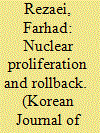

|
|
|
|
|
| Summary/Abstract |
This study seeks to provide answers to the following questions; what were the real
motivations behind Iran’s nuclear program?; to what degree did key players of
Iran’s nuclear program at a given time period fit the rational proliferator profile?;
and eventually, how did key elites agree on a unified set of parameters of rollback
in the nuclear program in exchange for the lifting of sanctions? The study has three
objectives. The first objective is to ascertain whether Iran fits the profile of a rational
proliferator. The second objective is to determine whether its response to sanctions
followed the rational modality expectations embedded in proliferation theories.
The third objective is to identify the background of the initial decision to pursue the
nuclear program with a special emphasis on key motivations and factors that helped
to drive it from a very modest beginning to a virtual breakout position.
|
|
|
|
|
|
|
|
|
|
|
|
|
|
|
|
| 6 |
ID:
156477
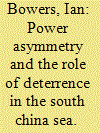

|
|
|
|
|
| Summary/Abstract |
China’s coercive activities in the South China Sea have resulted in a lively
academic debate regarding strategies to deter Beijing and maintain the status quo.
However, much of this literature has been dominated by the U.S.–China dynamic
and has neglected the vital role of the littoral states in the region. This article,
through the lens of a maritime strategic environment, deals with the potential for the
littoral nations of the South China Sea to deter China. It argues that conventional
deterrence by denial is a difficult but applicable strategy despite the substantial
power asymmetry that exists between China and the littoral states in the region.
However, such a deterrent approach must be tailored to the specific, non-existential
challenges that China poses in the region. Among these challenges, this article
examines deterrence within the context of China’s claim to the Spratly Islands and
expansive claims to economic exploitation rights. A maritime strategic environment
provides multiple avenues to impose cost on a superior power and the littoral states
in the region have invested heavily in naval capabilities. However, as this article
finds, it remains to be seen if the littoral states in the region have the technical
capability or political will to successfully enact such a deterrent strategy.
|
|
|
|
|
|
|
|
|
|
|
|
|
|
|
|
| 7 |
ID:
156474


|
|
|
|
|
| Summary/Abstract |
For Korean Peninsula watchers, the two most recent years have been tainted by
further North Korean provocations. Three nuclear tests and a series of missile tests
are signs that the North Korean nuclear crisis has reached a different level. While
talks have focused on deterring the use of nuclear weapons or destroying incoming
missiles using missile defense systems, relatively not much has been discussed
about North Korea’s nuclear strategy and doctrine. To make extended deterrence
against North Korea truly effective and fine-tune our counter–provocation strategy,
we need to think about how North Korea would use its nuclear weapons before
or during a war. One way to gain insight into its strategy is to examine its nuclear
doctrine. Whatever the initial purpose the North Korean leadership had in mind, it
has become clear that it is trying to build a second–strike capability, but whether
its nuclear doctrine is based on an “assured retaliation” or “asymmetric escalation”
strategy is to be watched carefully. North Korea’s reality indicates that an assured
retaliation strategy is more likely. But as its nuclear capability develops, it could aim
to adopt an asymmetric escalation strategy in the long-term. Before they accomplish
that goal, the ROK–U.S. alliance should find an effective means of changing North
Korea’s strategic thinking.
|
|
|
|
|
|
|
|
|
|
|
|
|
|
|
|
| 8 |
ID:
156475
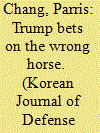

|
|
|
|
|
| Summary/Abstract |
North Korea’s pursuit of nuclear arms, and the U.S. effort to stop it, date back to the
1990s. In mid-1994, the United States was ready to use force—to launch a surgical
strike with cruise missiles on the North Korean reprocessing facility at Yongbyon,
which produces plutonium–the material for the nuclear bomb. At the last minute,
North Korea’s leader Kim Il Sung invited former U.S. president Jimmy Carter to
Pyongyang to salvage the crisis. Thereafter, the United States and North Korean
officials met in Geneva and worked out a deal, the Agreed Framework, in December
1994, thereby Pyongyang agreed to suspend its plutonium program, while the
United States, the ROK and Japan would build two light-water reactors for North
Korea to generate electric power. The Americans find North Korean officials
skillful in deception and duplicity, which is rather difficult to deal with. In spite of
their public commitments, the North Koreans are determined to possess nuclear
arms and find ways to continue their quest. They also excel in brinkmanship—they
provoke and make trouble, and then extol concessions/rewards for cooperation.
President Donald Trump, much like his predecessors, erroneously believes that
China is willing and has the economic leverage and political influence to rein in
Pyongyang’s leadership. Hence, Trump has tried to “outsource” North Korea’s
nuclear threat to Chinese leader Xi Jinping in the wake of their summit meeting in
April. Trump has offered a better trade deal to China, but Xi has been reluctant–
to White House officials, Trump’s “bet” is not paying off. As the threat perception
of China and the United States is different, and the interest and agenda of the two
nations in the Asia–Pacific are also vastly different, Xi cannot be expected to do
Trump’s bidding on North Korea. Xi’s primary concern is to prevent U.S. military
attacks on North Korea that would result in the collapse of Kim Jong Un’s regime,
and a pro-U.S. government in North Korea. Nor does Xi want to implement heavy
sanctions on Pyongyang which could destabilize Kim’s regime and drive hundreds
of thousands of refugees into China.
|
|
|
|
|
|
|
|
|
|
|
|
|
|
|
|
|
|
|
|
|